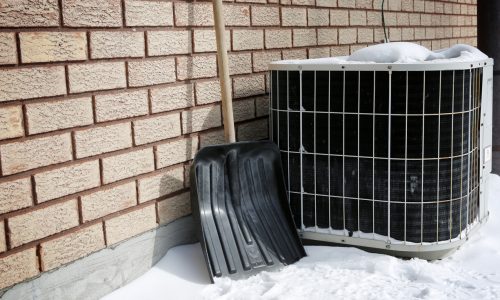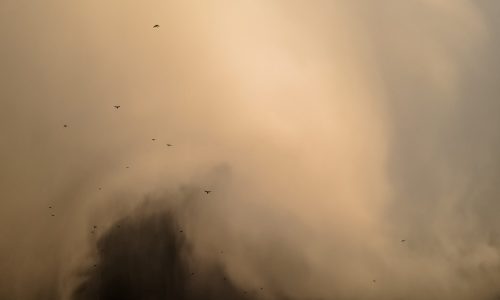Should I cover my air conditioner in the winter? It’s a question that’s been on the minds of many homeowners over the years.
Turning up the heat and stoking the fireplace are usually a more pressing concern for most, and many forget about the AC unit that’s exposed to the elements outdoors all winter. That being said, your air conditioner may only require some general cold weather maintenance to get it through the season, and can usually be left alone until the spring thaw and warm-up. But under which conditions should you cover your air conditioner in the winter? Read on to find out.
Does covering your air conditioner during winter months prevent damage?

Covering an air conditioner isn’t a foolproof method that guarantees the unit won’t need maintenance after winter is over. It will not fully prevent water damage or debris from building up within your air conditioning unit, so it’s more applicable as a way to minimize problems and prevent more extensive damage over the season.
However, it makes a lot of sense to utilize an AC cover for the outside unit if you live somewhere that has excessive snow, stormy conditions, hailstones, and so on. In the following sections, we will look more closely at the situations in which it is used.
When should you cover your air conditioner?
Following the answer to “should you cover your air conditioner in the winter,” the next most probable question is “when should you cover your AC?”
The answer to this question is situational rather than season-based. Here we have listed three situations when you must buy a cover for your air conditioner.
To prevent ice buildup
Whether or not the air conditioner is protected by a cover, snow will still accumulate on the unit. On the other hand, if snow gets into the air conditioner and freezes, the ice will grow, which might cause your air conditioner to get damaged.
But here the question again arises: Should you cover your AC in the winter? There is no cause for concern if there is snow on top of your air conditioner; the issue arises when the snow transforms into ice and causes expansion inside the air conditioner itself.
Covering the air conditioner during the winter will prevent snow from getting into the unit and will shield it from the potentially damaging effects of ice expansion.
Dusty or stormy weather

A protective AC cover may be effective in preventing certain tiny dirt particles from entering the system. Because of this, it is prudent to cover the AC not only in the autumn, but also in the winter. It is desirable for your outdoor air conditioning unit to collect as little dirt as possible during the course of the winter, particularly on the outside condensation coils and in the area next to the AC compressor.
Your air conditioner will be protected from debris such as leaves, twigs, and grass that may fall on it if it is covered. These objects have the potential to gather inside the air conditioning unit.
Further, if you do not remove these objects, the wind may easily bring the unwanted fragments to your air conditioning unit, where they may gather and lead to issues with the unit during the next year’s cooling period.
Even though covering the air conditioner will not solve this issue entirely, it will significantly reduce the amount of debris that gets trapped within the unit when it is operating outside.
When should you not cover your air conditioner?
Sub-zero temperatures
A cover for your AC will not prevent the unit from being damaged by cold weather. During the winter, the temperature may drop as low as -20 degrees Fahrenheit on occasion. When temperatures are below zero, covering the air conditioner does not in any way cause it to get warmer.
It is essential to keep in mind that air conditioning equipment is designed to survive very low winter temperatures on its own. Covering it won’t help one bit here.
Potential for mold or moisture growth
The air conditioner’s cover doesn’t stop condensation or mold growth. In fact, it does the opposite. Mold may proliferate and cause harm to your air conditioner if the outside AC unit is subjected to high levels of humidity.
Nevertheless, covering the air conditioning unit during the winter is one of the worst things that we could do to it. This will just serve to trap the moisture already present within the unit, resulting in increased relative humidity levels and increasing the risk that mold will begin to form.
What kind of covers are available for ACs?
There are coverings available for purchase that completely encase the condenser box, as well as others that solely protect the top of the equipment. The price of an AC condenser cover ranges from $50 to $200. You should choose to simply cover the top of your AC unit if you want to protect it from falling objects during the winter.
By placing something over the top of the air conditioner, you can prevent dust, debris, and even small animals from finding their way into the unit. It will also prevent moisture from getting in, which is a genuine concern that may lead to corrosion or mold.
You can prevent debris such as leaves, shrubs, and sticks from dropping into the unit by placing a piece of plywood over the top if you aren’t concerned about how it looks.
If you find out in the spring that you have a bunch of rodents or the condenser is full of debris or mold, it may be time to call in the professionals. A local air conditioning repair company like Autumn Air can inspect your unit to determine the extent of the damage and make repairs so that you don’t have to suffer through the spring and summer in the sweltering heat.
Ensure that your system is in top-notch condition this winter
We hope this article provides some perspective answering should you cover your AC unit in the winter. However, irrespective of the type of HVAC system, regular maintenance is the key to a well-functioning HVAC system. Make sure that you schedule a routine maintenance check for your system.
Nevertheless, your system can be wrecked by shoddy installations or lackadaisical maintenance. Therefore, always consult an experienced HVAC professional, such as Autumn Air, for all your HVAC needs.
You can directly call (602) 266-5247 or schedule the service here.













